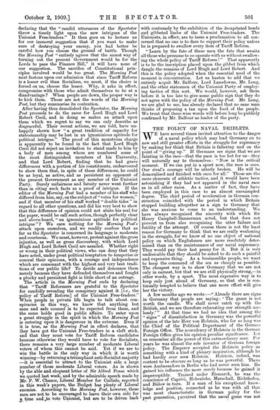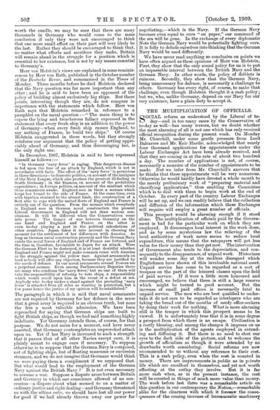THE POLICY OF NAVAL DRIBLETS.
WE have several times invited attention to the danger of a naval policy which may lead Germany on to new and still greater efforts in the struggle for supremacy by making her think that Britain is faltering and on the point of "giving up." If Germans see signs that we are fainting in the race—that the pace is too hot for us—they will naturally say to themselves: "Now is the critical moment. If we can put in a spurt now, the race is ours. Our rival's courage will be utterly broken. He will be demoralised and finished with once for all." Those are the mere elements of athletic tactics, and it would have been astonishing if they had not appeared in the naval race as in all other races. As a matter of fact, they have been employed in this race to an almost unexampled degree. The chief period of acceleration in German con- struction coincided with the period in which Britain stopped building altogether as a sign to Germany that she was anxious to come to an understanding We have always recognised the sincerity with which Sir Henry Campbell-Bannermau acted, but that does not prevent us from also recognising the utter failure and futility of the attempt. Of course there is not the least reason for Germany to think that we are really weakening in the struggle, for we know of no one object of national policy on whidh Englishmen are more resolutely deter- mined than on the maintenance of our naval supremacy. They would pay their last penny for it. But it is very undesirable that they should be asked to do such a painful and expensive thing. As a businesslike people, we want to keep the command. of the sea as cheaply as possible. The cheapest way is to show Germany that we are not only in earnest, but that we are still physically strong,—in other words, by a spurt. The most expensive way is to keep only just ahead of Germany, so that she is con- tinually tempted to believe that one more effort will give her the victory. A few months ago we wrote :—" Already there are signs in Germany that people are saying 'The game is not worth the candle. We shall never catch up with the British, and we are therefore exhausting our strength use- lessly.' At that time we had no idea that among the " signs " of dissatisfaction in Germany was the powerful opinion of the late Herr von Holstein, who for so long was the Chief of the Political Department of the German Foreign Office. The arcendency of Holstein in the German Foreign Office gives his opinion peculiar significance. Lf...t us remember all the power of this extraordinary man. For years he was almost the sole inventor of German foreign policy. The Emperor accepted the Holstein policy as something with a kind of plenary inspiration, although he had hardly ever seen Holstein. Holstein, indeed, was content to be obscure so long as he was powerful. There were Ambassadors in Berlin who had never seen him. He gained his influence the more surely because he gained it imperceptibly. Trained under Bismarck, he was the conscience of Caprivi, Hohenlohe, Marschall, Richthofen, and Billow in turn. If a man of his exceptional know- ledge and position, connected as he was with all that was most characteristic in German policy for the past generation, 1erceived that the naval game was not worth the candle, we may be sure that there are many thousands in Germany who would come to the same conclusion if only they were not encouraged to think that one more small effort on their part will very likely be the last. Rather they should be encouraged to think that, no matter what efforts and sacrifices they make, Britain will remain ahead in the struggle for a position winch is essential to her existence, but is not by any means essential to Germany's.
Herr von Holstein's views are explained in some reminis- cences by Herr von Rath, published in the October number of the Deutsche Revue, and summarised in the Times of Monday. Three months before he died Holstein declared that the Navy question was far more important than any other ; and he is said to have been an opponent of the policy of building almost exclusively big ships. But these points, interesting though they are, do not compare in importance with the statements which follow. Herr von Rath says that Holstein remarked in reference to a pamphlet on the naval question :—" The main thing is to expose the lying and treacherous fallacy expressed in the statement that every fresh ship is an addition to the power of Germany—when every fresh ship causes England, to say nothing of France, to build two ships." Of course Holstein exaggerated in these words, but they strongly reinforce our argument that the policy of getting appre- ciably ahead of Germany, and thus discouraging her, is the only right one.
In December, 1907, Holstein is said to have expressed himself as follows :— "In Germany 'navy fever' is raging. This dangerous disease is fed upon the fear of an attack by England, which is not in accordance with facts. The effect of the 'navy fever' is pernicious in three directions—in domestic politics, on account of the intrigues of the Navy League, which also produce the greatest ill-feeling in South Germany ; in the finances, on account of the prohibitive expenditure ; in foreign politics, on account of the mistrust which these armaments awake. England sees in them a menace which keeps her bound to the side of France. At the same time, even with taxation strained to the utmost limit, the construction of a fleet able to cope with the united fleets of England and Prance is entirely out of the question. From the menace which everybody in England sees in German naval construction the present Liberal Government in England will not draw serious con- clusions. It will be different when the Conservatives come into power. The danger of war between Germany on the one hand and England and France on the other is even to-day playing a part in the political calculations of other countries. Japan takes it into account in choosing the moment for the settlement of her differences with America. As long as German naval construction proceeds and the German Navy exists the naval forces of England and of France are fettered, and the time is, therefore, favourable to Japan for an attack. Were the German Fleet to be destroyed, it is at least doubtful whether England and France might not make common cause with America in the struggle against the yellow race. Against armaments on land nobody will offer any objection, because they are justified by the needs of defence. In our naval armaments several Powers Bee a perpetual menace. Even among Parliamentary Deputies there are many who condemn the 'navy fever,' but no one of them will take the responsibility of refusing to vote ships, a responsibility which would recoil upon him in the event of a defeat at sea. Anybody who to-day makes a stand against the prevailing navy fever' is attacked from all sides as wanting in patriotism, but a few years hence the justice of my opinion will be established."
The paragraph in which it is said that naval armaments are not required by Germany for her defence in the sense that a great army is required is an obvious truth, but none the less a most valuable admission. We have been reproached for saying that German ships are built to fight British ships, as though we had said something highly indelicate. Yet Germany intends them, of course, for that purpose. We do not mean for a moment, and have never asserted, that Germany contemplates an unprovoked attack upon us. Yet if her Navy is increased to such a strength that. it passes that of all other Navies except ours, it is plainly meant to engage ours if necessary. To suppose otherwise is to suppose that the German Navy is composed, not of fighting ships, but of floating museums or excursion steamers, and we do not imagine that Germans would think we were paying them a compliment if we supposed that. But what would lead to the employment of the German Navy against the British Navy ? It is not even necessary. to assume a war. Suppose a dispute arose between Britain. and Germany in which our conscience allowed of no con- cession—a dispute about what seemed to us a matter of ordinary justice and right dealing—and Germany threatened us with the ultima ratio, we should have lost all our power for good if we had already thrown away our power for negotiating,—which is the Navy. If the German Navy becomes even equal to ours "on paper," our command of the sea. will be gone. In the exchange of every diplomatic Note the German Navy would be potentially fighting ours. It is folly to delude ourselves into thinking that the German Navy would be used differently.
We have never read anything so conclusive on points we have often argued as these opinions of Herr von Holstein. First, they show that the only sound policy for us is to put an impassable interval between the British Navy and the German Navy. In other words, the policy of driblets is ruinous. Secondly, they show that the German Navy, being unnecessary for defence, is necessarily a challenge to others. Germany has every right, of course, to make that challenge, even though Holstein thought it a rash policy; but we, who, unlike Germany, depend on our Navy for our very existence, have a plain duty to accept it.



























































 Previous page
Previous page